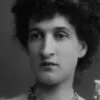If any young Miss reads this autobiography and wants a little advice from a very old hand, I will say to her, when a man threatens to commit suicide after you have refused him, you may be quite sure he is a vain, petty fellow or a great goose; if you felt any doubts about your decision before, you need have none after this and under no circumstances must you give way. To marry a man out of pity is folly; and if you think you are going to influence the kind of fellow who has “never had a chance, poor devil,” you are profoundly mistaken. One can only influence the strong characters in life, not the weak; and it is the height of vanity to suppose that you can make an honest man of anyone.
Margot Asquith (1864-1945) British socialite, author, wit [Emma Margaret Asquith, Countess Oxford and Asquith; Margot Oxford; née Tennant]
Autobiography, Vol. 1, ch. 7 (1920)
(Source)
In a similar vein, in More or Less about Myself, ch. 5 (1934) she wrote: "It is easier to influence strong than weak characters in life."
Quotations by:
Asquith, Margot
The Almighty is a wonderful handicapper: He will not give us everything.
Margot Asquith (1864-1945) British socialite, author, wit [Emma Margaret Asquith, Countess Oxford and Asquith; Margot Oxford; née Tennant]
Autobiography, Vol. 1, ch. 8 (1920)
(Source)
From the happy expression on their faces you might have supposed that they welcomed the war. I have met with men who loved stamps, and stones, and snakes, but I could not imagine any man loving war.
Margot Asquith (1864-1945) British socialite, author, wit [Emma Margaret Asquith, Countess Oxford and Asquith; Margot Oxford; née Tennant]
Autobiography, Vol. 2, 3 Aug 1914 (1922)
(Source)
Of the cheering crowds outside 10 Downing Street on 3 Aug 1914, the night before the British Government (with her husband as Prime Minister) declared war against Germany.
Rich men’s houses are seldom beautiful, rarely comfortable, and never original. It is a constant source of surprise to people of moderate means to observe how little a big fortune contributes to Beauty.
Margot Asquith (1864-1945) British socialite, author, wit [Emma Margaret Asquith, Countess Oxford and Asquith; Margot Oxford; née Tennant]
Autobiography, Vol. 2, 5 May 1908 (1922)
(Source)
Speaking for myself, I could never pray to be delivered from sudden death. It is how you live, and not how you die that counts, and sudden deaths are only sad for those who are left. It is not dying, but living, that is a preparation for Death.
Margot Asquith (1864-1945) British socialite, author, wit [Emma Margaret Asquith, Countess Oxford and Asquith; Margot Oxford; née Tennant]
More Memories, ch. 11 (1933)
(Source)
Convictions no doubt have to be modified or expanded to meet changing conditions […] but to be a reliable political leader sooner or later your anchors must hold fast where other men’s drag.
Margot Asquith (1864-1945) British socialite, author, wit [Emma Margaret Asquith, Countess Oxford and Asquith; Margot Oxford; née Tennant]
More or Less about Myself, ch. 3 (1934)
(Source)
That is why I think we are unfinished, and in our quest for Truth discover sooner or later that the greatest Truth can never be revealed to us through our intellect. We cannot pierce the silence that screens us from a mysterious conception, and are not content to believe that “now we see through a glass darkly: but then face to face.” There is nothing more perplexing in life than to know at what point you should surrender your intellect to your faith.
Margot Asquith (1864-1945) British socialite, author, wit [Emma Margaret Asquith, Countess Oxford and Asquith; Margot Oxford; née Tennant]
More or Less about Myself, ch. 11 (1934)
(Source)
It is not often that you can say a political conviction coincides with a religious belief; but I think to look upon foreigners as enemies and try and draw a tight string round ourselves and our possessions to keep them out, is not only profoundly anti-Christ but contrary to all wisdom.
Margot Asquith (1864-1945) British socialite, author, wit [Emma Margaret Asquith, Countess Oxford and Asquith; Margot Oxford; née Tennant]
More or Less about Myself, ch. 11 (1934)
(Source)

